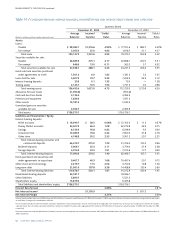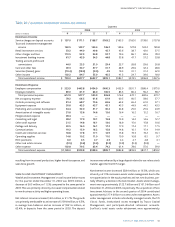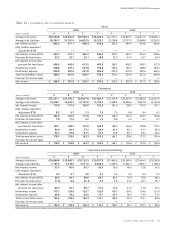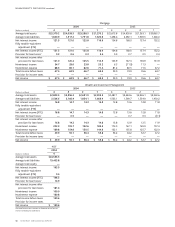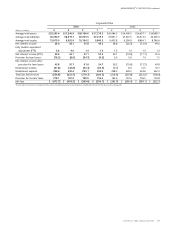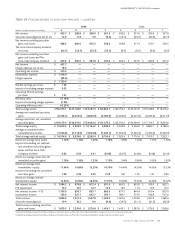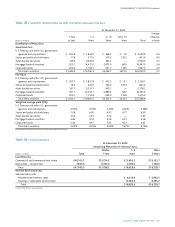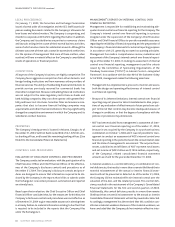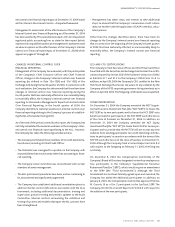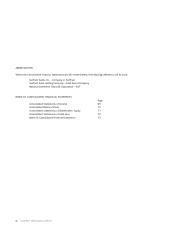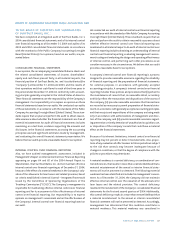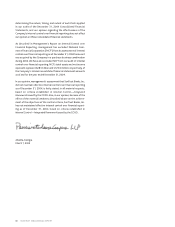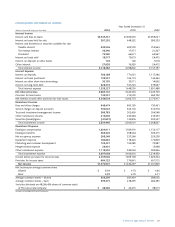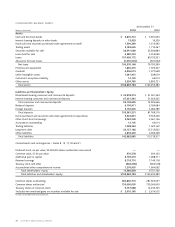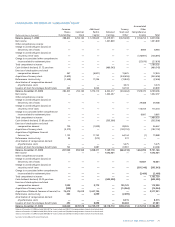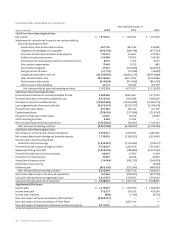SunTrust 2004 Annual Report Download - page 64
Download and view the complete annual report
Please find page 64 of the 2004 SunTrust annual report below. You can navigate through the pages in the report by either clicking on the pages listed below, or by using the keyword search tool below to find specific information within the annual report.
62 SUNTRUST 2004 ANNUAL REPORT
MANAGEMENT’S DISCUSSION continued
SUPERVISION AND REGULATION
As a bank holding company and a financial holding company, the
Company is subject to the regulation and supervision of the Board
of Governors of the Federal Reserve System (the Federal Reserve).
SunTrust Bank is a Georgia state bank which has branches in
Georgia, Florida, Tennessee, Alabama, Virginia, Maryland, South
Carolina, and the District of Columbia. SunTrust Bank is a member of
the Federal Reserve System, and is regulated by the Federal Reserve
and the Georgia Department of Banking and Finance. Effective
October 1, 2004, NCF, a Tennessee corporation and registered bank
holding company merged with and into the Company. By virtue of
the merger, the Company acquired NCF’s two wholly owned bank
subsidiaries: NBC and NBC Bank, FSB (NBC FSB), as well as NCF’s
49% ownership interest in First Market, FSB. NBC is a national bank
chartered under the National Banking Act and, as such, is subject to
regulation and examination primarily by the Office of the
Comptroller of the Currency (the OCC) and, secondarily, by the FDIC
and the Federal Reserve Board. In certain markets, NBC operates
under the name “Central Carolina Bank” or CCB,“Wal-Mart Money
Center by National Bank of Commerce,” and “El Banco.” NBC offers
commercial and retail banking, savings, and trust services through
CCB branches located in North Carolina and South Carolina,Wal-
Mart Money Centers in Georgia and Tennessee, and NBC branches in
Tennessee, Mississippi, Arkansas, Georgia,Virginia, and West Virginia,
and El Banco branches in Georgia.
NBC Bank, FSB and First Market Bank, FSB are federal savings banks
primarily regulated by the Office of Thrift Supervision (the OTS).
NBC Bank, FSB is headquartered in Memphis,Tennessee and has
branches in Mississippi and Florida.
The Company’s banking subsidiaries are subject to various require-
ments and restrictions under federal and state law, including
requirements to maintain reserves against deposits, restrictions on
the types and amounts of loans that may be made and the interest
that may be charged thereon, and limitations on the types of invest-
ments that may be made and the types of services that may be
offered.Various consumer laws and regulations also affect the oper-
ations of the banks. In addition to the impact of regulation, com-
mercial banks are affected significantly by the actions of the Federal
Reserve as it attempts to control the money supply and credit avail-
ability in order to influence the economy.
Pursuant to the Riegle-Neal Interstate Banking and Branching
Efficiency Act of 1994, bank holding companies from any state may
acquire banks located in any other state, subject to certain condi-
tions, including concentration limits. In addition, a bank may estab-
lish branches across state lines by merging with a bank in another
state, subject to certain restrictions.
There are a number of obligations and restrictions imposed on bank
holding companies and their depository institution subsidiaries by
federal law and regulatory policy that are designed to reduce poten-
tial loss exposure to the depositors of such depository institutions
and to the FDIC insurance fund in the event the depository institu-
tion becomes in danger of default or is in default. For example,
under a policy of the Federal Reserve with respect to bank holding
company operations, a bank holding company is required to serve as
a source of financial strength to its subsidiary depository institu-
tions and commit resources to support such institutions in circum-
stances where it might not do so absent such policy. In addition, the
“cross-guarantee” provisions of federal law require insured deposi-
tory institutions under common control to reimburse the FDIC for
any loss suffered or reasonably anticipated as a result of the default
of a commonly controlled insured depository institution or for any
assistance provided by the FDIC to a commonly controlled insured
depository institution in danger of default.
The federal banking agencies have broad powers under current
federal law to take prompt corrective action to resolve problems
of insured depository institutions. The extent of these powers
depends upon whether the institutions in question are “well
capitalized,”“adequately capitalized,”“undercapitalized,”“signifi-
cantly undercapitalized” or “critically undercapitalized” as such
terms are defined under regulations issued by each of the federal
banking agencies.
There are various legal and regulatory limits on the extent to which
the Company’s subsidiary banks may pay dividends or otherwise
supply funds to the Company. In addition, federal and state bank
regulatory agencies also have the authority to prevent a bank or
bank holding company from paying a dividend or engaging in any
other activity that, in the opinion of the agency, would constitute
an unsafe or unsound practice.
FDIC regulations require that management report annually on its
responsibility for preparing its institution’s financial statements,
and establishing and maintaining an internal control structure, and
procedures for financial reporting, and compliance with designated
laws and regulations concerning safety and soundness.
The Company’s nonbanking subsidiaries are regulated and super-
vised by various regulatory bodies. For example, SunTrust Capital
Markets, Inc. is a broker-dealer and investment adviser registered
with the Securities and Exchange Commission (SEC) and a member
of the New York Stock Exchange, Inc. and the National Association
of Securities Dealers, Inc. (NASD). SunTrust Securities, Inc. is also a
broker-dealer and investment adviser registered with the SEC and a
member of the NASD.Trusco Capital Management, Inc. is an invest-
ment adviser registered with the SEC.The Company also has one
limited purpose national bank subsidiary, SunTrust BankCard, N.A.,
which is regulated by the OCC.
In the second quarter of 2005, the Company intends to merge NBC
and NBC Bank, FSB and SunTrust BankCard, N.A., into SunTrust
Bank.The completion of the mergers is subject to a number of con-
ditions and receipt of required regulatory approvals.Although it is
currently anticipated that the mergers will take place in the second
quarter of 2005, the Company cannot give any assurance as to
when, or if, the mergers will occur.


